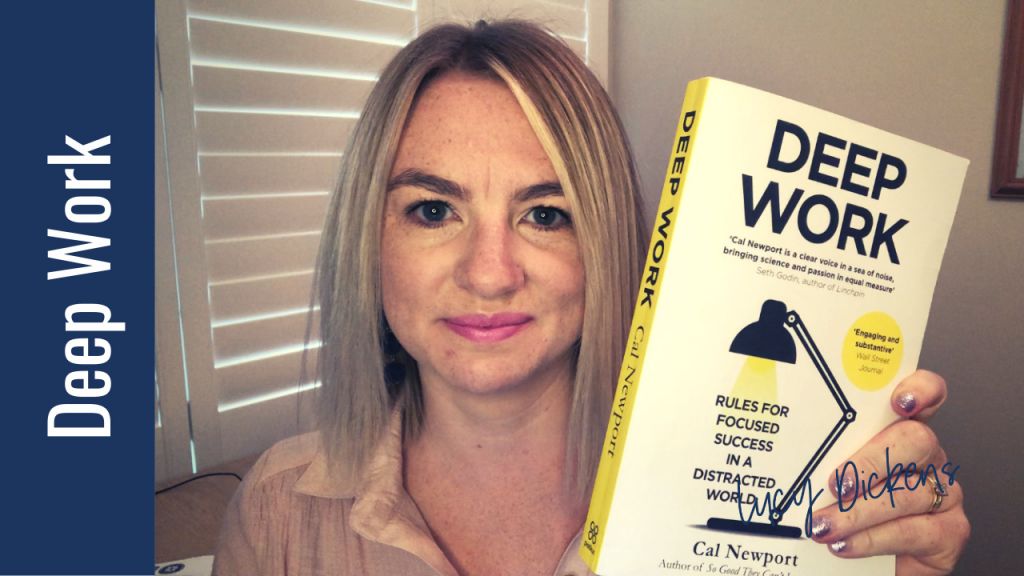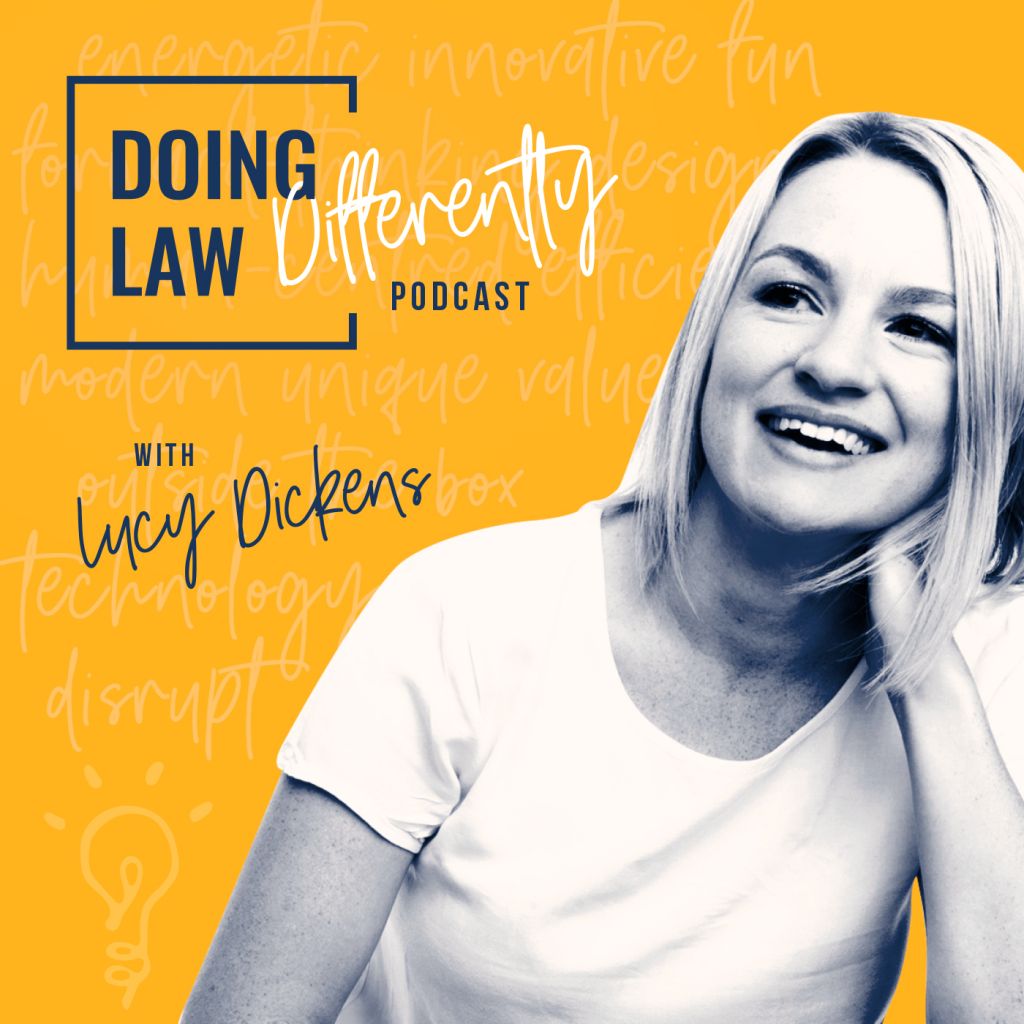My weekly(ish) musings as I reflect on the business books I read.
I got myself excited about my new YouTube venture, and since then I haven’t managed to fit in much reading as I’ve spent the last few weeks hard at work finishing my own book, It’s Time To Do Law Differently: How to reshape your firm and regain your life. Now it’s finally at the printers so I have the mental space to look at someone else’s words. Cal Newport’s Deep Work was next on my pile of books. It’s all about the Rules For Focused Success In A Distracted World.
Watch my book musings on my YouTube channel or read on for the written version.
Deep Work is defined as ‘Professional activities performed in a state of distraction-free concentration that push your cognitive capabilities to their limit. These efforts create new value, improve your skill, and are hard to replicate.’ (p3)
Ironically, I found it really hard to get into this book. I usually read a book in a day or two, but this one has been broken across weeks. I don’t know if that’s because of the book itself of what’s going on in my world, but I have since heard from at least one other person that they too found it hard to get stuck into too.
The idea is that highly focused and concentrated deep work can produce a huge output. The book is all about how to do deep work and how to manage your schedule to make time for it.
‘Three to four days, five days a week, of uninterrupted and carefully directed concentration, it turns out, can produce a lot of valuable output.’ (p16)
It’s broken into two parts.
Part One is about The Idea – what is Deep Work? This is the part I struggled with most. I like practical, “how to” type books, so it’s not a surprise that I preferred Part Two – The Rules.
Part Two is all about the rules for deep work. Those are:
Rule 1: Work Deeply
Rule 2: Embrace Boredom
Rule 3: Quit Social Media
Rule 4: Drain the Shallows
Rule 1: Work Deeply
This rule is about replacing distraction with focus. We don’t need every single hour of our work to become deep work, but we need to find a way to integrate deep work into our lives. The book offers different ways to do that, for example by cutting out distractions so you can focus your time or by scheduling short but regular periods of deep work (bimodal philosophy of deed work) among others.
There was a lot of focus here on having a dedicated place to work deeply. One example is of J K Rowling who checked into a hotel at $1000 per day because it was near a Hogwarts style castle and the surroundings helped her to focus.
There’s a section in Rule 1 called Execute Like A Business and this is the part of the whole book that I resonated with the most.
The idea is from Harvard Business School Professor Clayton Christensen about the distinction between the “way” and “how”. Christensen talks about ‘The 4 Disciplines of Execution’ that help companies to implement high level strategies:
1. Focus on the Wildly Important
It’s not enough to just decide to spend more time working deeply. What are the wildly important goals that you want to achieve?
‘Execution should be aimed at a small number of “wildly important goals.”’ (p136)
‘For an individual focused on deep work, the implication is that you should identify a small number of ambitious outcomes to pursue with your deep work hours. The general exhortation to “spend more time working deeply” doesn’t spart a lot of enthusiasm.’ (p137)
2. Act on the Lead Measures
Measure success by lead measures – that is, the input, not the output. If you measure lag measures, you’re always measuring something historical and it’s too late to change it
The example given in the book – if you’re trying to improve customer satisfaction, the relevant lag measure is your customer satisfaction score. The problem with this is that when you measure it, the performance that drove those scores is already in the past. Instead, lead measures ‘measure the new behaviours that will drive success on the lag measures’, for example, the number of customers who receive free samples.
‘For an individual focused on deep work, it’s easy to identify the relevant lead measure: time spent in a state of deep work dedicated toward your wildly important goal.’ (p138)
Instead of tracking papers published, the author instead tracked time spent in deep work, a tally that became directly relevant to his deep work every single day.
When I was writing my manuscript for my book, I tracked number of words written. This worked well for the initial draft, because I was motivated by watching the number of words go up. The problem came when I had finished writing and needed to start editing. Motivation started to drop off as I couldn’t see significant progress each day. Perhaps tracking deep work hours might have helped me.
3. Keep a Compelling Scoreboard
Don’t just track your lead measures, record them physically on display in the workspace
4. Create a Cadence of Accountability
Teams must meet regularly to talk about their wildly important goal and review their scoreboard, commit to actions to improve the score and review the commitments they made at the last meeting. Even if you don’t have a team, you should hold this meeting with yourself to check in with your goal and adjust your work habits and schedule if you need to.
I already practice disciplines one and four, so I’m going to give some thought to the second two and see how I can work these into my routine as well. I can do deep work well when I get into it, but I also enjoy ticking off the busy work (or, shallow work) like organising my schedule, sorting out my emails and tasks and can easily prioritise that, especially when I feel overwhelmed. Perhaps tracking my deep work hours will work for me too.
A final point about rule one: working deeply isn’t all about shutting yourself off from the world and working hard:
‘This strategy argues that you should follow Kreider’s lead by injecting regular and substantial freedom from professional concerns in to your day, providing you with the idleness paradoxically required to get (deep) work done.’ (p143)
As part of this is the idea of a shutdown ritual, helping you switch off from the day’s work and help stop work from dominating your mind when you aren’t working. This is something I relate to and have done for a while now. It definitely helps me to switch off and move from work mode to mum mode.
Rule 2: Embrace Boredom
To really excel at deep work, we need to embrace boredom.
‘Efforts to deepen your focus will struggle if you don’t simultaneously wean your mind from a dependence on distraction. Much in the same way that athletes must take care of their bodies outside of training sessions, you’ll struggle to achieve the deepest levels of concentration if you spend the rest of your time felling the slightest hint of boredom.’ (p157)
Don’t take breaks from distraction, instead take breaks from focus.
Rule 3: Quit Social Media
This rule is just as it sounds. Quit, or at least be more critical of, social media use. Newport is pretty harsh in this chapter and offers little sympathy for excuses to continue with social media use. But his point is that Deep Work requires you to be free from distraction and so, rather than using social media by default because it brings some benefits, he offers a craftsman approach to tool selection which encourages you to only use social media that ‘aids to the larger goals of one’s craft’:
‘The Craftsman Approach to Tool Selection: Identify the core factors that determine success and happiness in your professional and personal life. Adopt a tool only if its positive impacts on these factors substantially outweigh its negative impacts.’ (p191)
Rule 4: Drain the Shallows
This rule is about an acknowledgement that not all work we do can or should be deep work. We also need to “drain the shallows” – shallow work, like checking emails, is needed for most of our jobs, but ‘we should see the goal of this rule as taming shallow work’s footprint in your schedule, not eliminating it.’ (p219)
Shallow work is ‘Noncognitively demanding, logistical-style tasks, often performed while distracted. These efforts tend not to create much new value in the world and are easy to replicate.’
‘I’m asking you to treat shallow work with suspicion because its damage is often vastly underestimated and its importance vastly overestimated. This type of work is inevitable, but you must keep it confined to a point where it doesn’t impede your ability to take full advantage of the deeper efforts that ultimately determine your impact.’ (p221)
How to do this?
- Schedule every minute of your day – we underestimate how long things take us, so this can take some practice.
- Quantify the depth of your activities – know how much of your work is deep work and what is shallow. You can also schedule this work to fit your flow of work.
- Finish your work by 5:30 – by having fixed finish time, you force yourself to find your productive hours during your work day
- Become hard to reach – specific strategies for managing email.
My takeaways and action items
- Start counting and physically recording time spent in deep work to help me keep track of how effectively I’m using my time and how long work takes me. I also plan to do some more research on Christensen’s The 4 Disciplines of Execution.
- Think more about space for deep work. I like to work in familiar surroundings, but other than knowing I prefer to work in my office or home than a random café, I haven’t put much thought into where I work. I like the idea of working from a beautiful retreat and could put some effort into making my home office into more of a haven.
Would I recommend this book?
I did find it quite a struggle to get into, but the second half of the book has a lot of practical tips (rules) for deep work. If you find yourself doing lots of busy work and not getting stuff done, you’ll find this useful. Maybe try the audio version!
For more reviews like this one, subscribe to my new YouTube channel where I’ll share my weekly(ish) business book notes.





